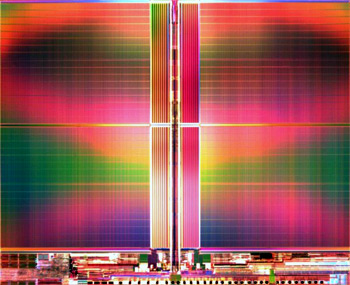Micron Intros the World's Smallest 128Gb NAND Flash Device
Micron's new flash memory device stores 128 Gb in just 146 mm2 of space
At the International Solid-State Circuits Conference taking place on February 19th, Micron is expected to present a paper on its new 128 Gb (gigabit) flash memory device which measures just 146 mm² and is currently the smallest of its kind. The device utilities the company's 20 nanometer processing technology and a triple-level-cell (TLC) that stores 3 bits of data per cell and is more than 25 per cent smaller than the company's current multi-level-cell (MLC) devices.
Glen Hawk, Vice-President of Micron's NAND Solutions Group has stated that the device would be "empowering a new class of consumer storage applications" and is primarily aimed at the removable storage market (specifically memory cards and USB flash drives) which is expected to constitute 35 percent of the NAND market in 2013.
Micron is currently sampling the 128 Gb TLC device with "select partners" and should be available for purchase by Q2 2013 at a yet to be determined price.
Contact Us for News Tips, Corrections and Feedback
Get Tom's Hardware's best news and in-depth reviews, straight to your inbox.
Tarun Iyer was a contributor for Tom's Hardware who wrote news covering a wide range of technology topics, including processors, graphics cards, cooling systems, and computer peripherals. He also covered tech trends such as the development of adaptive all-in-one PCs.
-
A Bad Day I wonder how many write cycles can the 20nm Flash take? Every Flash shrinkage usually results in reduction of max write cycles it can tolerate, requiring more wear-reduction measures.Reply
Though on the plus side, there's nothing wrong with SSDs being cheaper. :D -
A Bad DayI wonder how many write cycles can the 20nm Flash take? Every Flash shrinkage usually results in reduction of max write cycles it can tolerate, requiring more wear-reduction measures.Though on the plus side, there's nothing wrong with SSDs being cheaper.Reply
Weren't there some engineers in Taiwan who were working on some solution for slowing down wear on SSD's. I think it had something to do with heating the memory after writing. -
merikafyeah I would be EXTREMELY surprised if a consumer can wear out an SSD from purely maxing out the write count. 120 GB SSDs should last more than 5 years even if you were to write 10GBs to it every day non-stop for the whole 5 years.Reply
But 5 years from now would you still be using the same 120 GB drive? ALL things wear out in time, especially storage mediums, and they're replaced by newer, better technology. The only things that can be expected to reliably store data for decades are M-Discs, but those only store as much as a DVD (for now). -
game junky I am interested to see the performance specs and longevity figures for these - smaller fabrication means they can pack more storage into smaller devices. I am imagining smart phones and digital cameras with massive internal storage - add in new wireless standards for synchronizing to a computer and cloud storage platforms and things just keep looking easier and faster.Reply
Keep it coming, guys -
didyoucheckyourtcpip That's only 16GB (Gb=Gigabit, GB=Gigabyte, 1 byte=8 bits). That's somewhat misleading advertising for storage technology.Reply -
freggo didyoucheckyourtcpipThat's only 16GB (Gb=Gigabit, GB=Gigabyte, 1 byte=8 bits). That's somewhat misleading advertising for storage technology.Reply
"Only 16GB" ... oh, how times have changed :-)
-
chewy1963 didyoucheckyourtcpipThat's only 16GB (Gb=Gigabit, GB=Gigabyte, 1 byte=8 bits). That's somewhat misleading advertising for storage technology.Reply
They are talking about a new chip, not a new complete storage device. It is common on the chip level to specify memory in bits instead of bytes. I'm sure when the chip is used in say an SD card, it will give the capacity in bytes.
